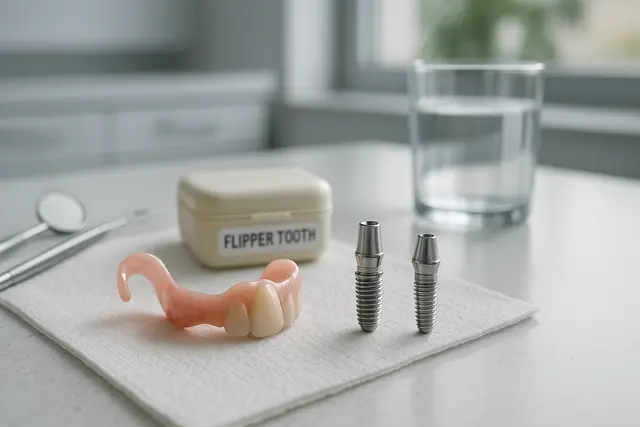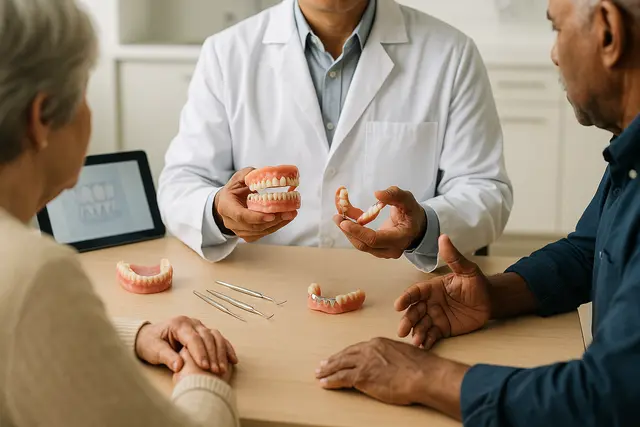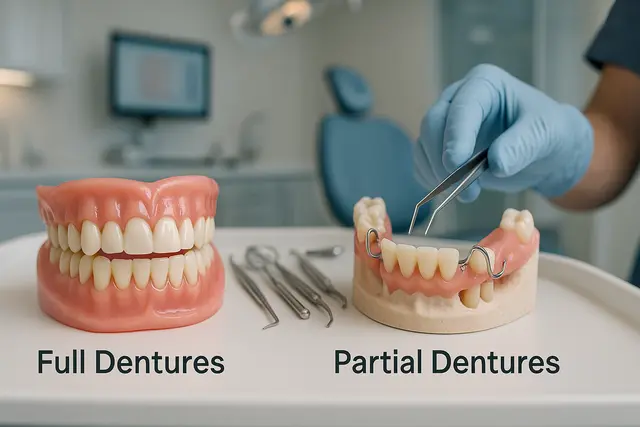Prosthodontics
5 min read
Nov 02, 2025
Flipper Tooth With Implants: Pros and Cons
Missing a tooth can impact more than just your smile, it can affect your confidence, your bite, and your overall oral health. With several tooth replacement options available, it’s important to understand the pros and cons of each before making a decision. One common temporary solution is the flipper tooth, often used as a placeholder before more permanent treatments like dental implants.

If you’re missing a tooth or even several missing teeth, the road to restoring your smile can feel overwhelming. You’re faced with a sea of options: dental flipper, dental implant, partial dentures, bridges... and that’s just the beginning. Whether your missing teeth are due to tooth decay, injury, or a necessary tooth extraction, you deserve a tooth replacement solution that fits your lifestyle, budget, and long-term goals.
One option that often pops up as a temporary fix is the flipper. You’ve probably heard of it referred to as a flipper tooth or dental flipper, especially if your dentist has mentioned it as a stopgap before getting dental implants. But what exactly is it? How does it compare to other tooth replacement options like implants or a dental bridge? And what are the real pros and cons?
Flipper: What It Is and Why It Exists
A flipper is a lightweight, removable acrylic device designed to fill the gap left by a missing tooth. Think of it as a placeholder, a temporary tooth replacement that helps you smile, chew (lightly), and talk more comfortably until a more permanent solution is in place.
Flipper teeth often come into play after tooth extraction, especially if the plan is to eventually get a dental implant. The flipper rests on your gums and may hook onto adjacent teeth for extra stability. It’s made from acrylic, which makes it easy to mold and quick to produce. That’s why many dentists recommend it when you need something fast and affordable.
If you’ve ever seen someone pop in a front flipper tooth before a photo or event, you’ve seen this little prosthetic in action.
Dental Flipper: Pros and Cons You Should Know
Pros
Affordable and quick: A dental flipper can be made quickly and usually costs less than other temporary tooth alternatives.
Minimally invasive: No surgery is needed. It simply fits into place and is easy to remove.
Improves appearance: It helps you feel confident smiling again, especially if you’re missing a front tooth.
Temporary but effective: It bridges the gap while you wait for a more permanent tooth replacement like dental implants.
Cons
Can feel bulky or awkward: Especially when you're first wearing a dental flipper.
May loosen over time: Since it's removable and made from acrylic, it doesn't have the secure fit of a permanent solution.
Needs proper care: You’ll have to clean your flipper daily to avoid gum irritation or oral health issues.
Not meant for heavy chewing: You’ll need to be cautious when eating, and avoid tough or sticky foods.
Dental Implant Benefits and How It Works
A dental implant is often the gold standard for tooth replacement. It involves surgically placing a small titanium post into your jawbone. That post acts as a new tooth root, with one or more prosthetic teeth attached to the top.
Dental implants function like natural teeth, providing long-term stability, preserving your jawbone, and preventing the shifting of remaining natural teeth. If you're a candidate for dental implants, your dentist may suggest waiting until your gum and bone have healed before placing the implant, this is when a flipper may come in handy.
Implants offer several big advantages:
A permanent solution: With proper care, implants can last a lifetime.
Strong and stable: You can eat normally without fear of dislodging anything.
Protects existing teeth: Unlike a dental bridge, implants don’t require grinding down adjacent teeth.
Supports oral health: They stimulate your jawbone just like real teeth, helping to avoid bone loss.
Of course, there are downsides. Dental implants may require several appointments, healing time, and they’re more expensive compared to dental flippers or partial dentures.
Flipper Teeth vs. Partial Dentures
Now let’s say you’re missing many teeth or one or more artificial teeth across your upper or lower jaw. In that case, partial dentures may be a better fit, literally and figuratively.
A partial denture is a removable device designed to replace several missing teeth and restore your bite. It’s sturdier than a dental flipper and usually made from a combination of acrylic and metal.
Here’s how they compare:
Partial dentures or implants? Implants are longer-lasting, but partials are more budget-friendly and quicker to make.
Flippers or partial dentures? A flipper is more of a temporary solution for one or two teeth, while partial dentures handle many teeth at once.
Keep in mind that both partial dentures and dental flippers are removable. You’ll need to clean them daily, avoid sleeping with them in, and see your dentist for an adjustment if they start to feel loose or uncomfortable.
Gum Health and Proper Care Matter
Whether you’re using a flipper, wearing partial dentures, or healing from dental implant surgery, taking care of your gums is crucial. Poor oral hygiene can lead to infections, irritation, or even implant failure.
Clean your flipper daily with gentle soap and water, and brush your remaining teeth as usual. If you’re using a flipper for the long haul, talk to your dentist about any gum tenderness or soreness you feel.
Permanent Solution or Temporary Fix: Which Is Best for You?
Here’s the honest answer: it depends.
If you’re missing a tooth and want something fast while you wait for a more permanent replacement, a flipper may be the best temporary solution. It’s affordable, quick to get, and gives you peace of mind in social settings.
If you’re looking for a permanent tooth replacement that will function like natural teeth and last with proper care, dental implants are the top-tier option. They don’t rely on other teeth, they protect your jawbone, and they offer unmatched stability.
But if implants are out of your budget or you’re missing many teeth, partial dentures or bridges may be a better fit.
Flipper Dentures and Other Tooth Alternatives to Consider
Flipper dentures are just another name for flipper teeth when they’re replacing more than one tooth. They’re still removable and usually made from acrylic. But they’re not the only game in town.
Some patients opt for solutions like dental implants combined with bridges to get both coverage and durability. Others choose full dentures when too many teeth are gone. Your dentist can walk you through the best replacement solution for your needs based on your bone structure, remaining teeth, and lifestyle.
Finding the Right Fit Starts With the Right Dentist
Every smile is unique, and so is every patient. If you’re wondering whether a flipper, dental implant, or another option is right for you, your next step should be a consultation. A skilled dentist can assess your needs, walk you through your options, check your dental insurance, and help you plan both short- and long-term care.
Whether you’re missing a tooth or many, there’s a path forward, and it starts with a plan that’s just right for you.
What Is a Flipper Tooth and When Is It Used?
A flipper tooth is a lightweight, removable acrylic prosthetic designed to temporarily replace one or more missing teeth. It is commonly used after tooth extraction while gums and bone heal before getting a more permanent solution such as a dental implant. Flippers help maintain your smile, support speech, and provide limited chewing ability, making them ideal for short-term cosmetic and functional needs.
What Are the Pros and Cons of Using a Flipper Tooth?
A flipper tooth offers quick, affordable tooth replacement without surgery, making it a convenient temporary option. It improves appearance and confidence during healing periods. However, it may feel bulky, loosen over time, and isn't built for hard chewing. Because it rests on the gums, it can cause irritation if not cleaned properly, and it doesn’t prevent bone loss like implants do.
How Does a Flipper Tooth Compare to a Dental Implant?
A flipper tooth is a temporary, removable device meant for short-term use, while a dental implant is a permanent solution surgically placed into the jawbone. Implants act like natural teeth, providing strong bite function, preventing bone loss, and lasting decades with care. Flippers cost less upfront and require no surgery, but implants offer long-term durability, stability, and better oral health benefits.
When Is a Partial Denture or Bridge Better Than a Flipper?
A partial denture may be better if you’re missing multiple teeth and want a sturdier removable option, while a dental bridge works well when implants aren’t suitable and adjacent teeth can support crowns. A flipper is ideal for temporary use, especially when planning for an implant. For long-term function, stability, and chewing strength, partial dentures, bridges, or implants are generally better choices depending on your case.
Read Next
Related Posts

Prosthodontics
Differences Between Zirconia and Acrylic Dentures: Benefits, Drawbacks, and Tips
Choosing between zirconia and acrylic for dental implants can feel overwhelming, especially when both materials offer unique advantages. This guide breaks down the essential differences, benefits, and limitations of each option to help you make a more confident, informed decision about your dental restoration journey.
5 min read
Nov 03, 2025

Prosthodontics
Dentures vs. Partial Dentures Pros and Cons: Helping You Make the Best Choice
Tooth loss can impact everything from your self-confidence to your ability to enjoy your favorite foods. Fortunately, modern dentistry offers practical solutions that restore both function and aesthetics. Two of the most common options are full dentures and partial dentures, each with its own advantages and limitations.
5 min read
Nov 03, 2025

Prosthodontics
Partial Dentures vs. Full Dentures Comparison: What Works Best for Your Situation
Choosing between partial and full dentures is an important step in restoring both your smile and confidence. With each option designed to meet different dental needs, understanding their differences can help you make the right decision for your oral health and lifestyle.
5 min read
Nov 03, 2025
Don’t have time to research every dentist around you?
See why 30k+ patients trusted us